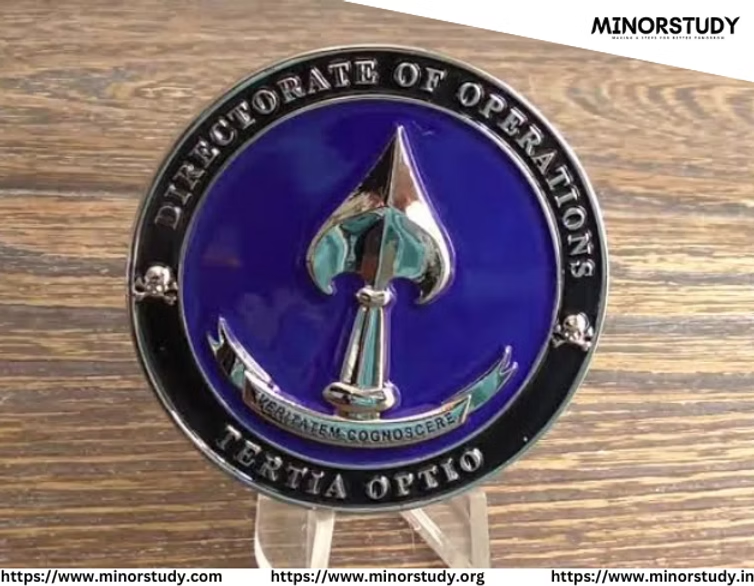The Directorate of Operations (DO) is a branch within several intelligence organizations worldwide, primarily focused on clandestine activities, covert operations, and human intelligence (HUMINT) collection. It plays a critical role in gathering actionable intelligence through undercover agents, informants, and espionage, often operating in high-risk environments.
- Directorate of Operations in the U.S. Central Intelligence Agency (CIA)
- Directorate of Operations in Other Agencies
- Australian Secret Intelligence Service (ASIS)
- MI6 (UK):
- Mossad (Israel):
- Research and Analysis Wing (RAW – India):
- Key Traits of the Directorate of Operations
- Skills and Training for Operatives
- Challenges
- Significance
Directorate of Operations in the U.S. Central Intelligence Agency (CIA)
Overview
The Directorate of Operations (DO) is a key component of the CIA responsible for conducting clandestine operations globally.
It gathers foreign intelligence primarily through human intelligence (HUMINT) methods, such as recruiting foreign agents, running spy networks, and conducting covert missions.
Formerly known as the Directorate of Plans, the DO has been instrumental in the CIA’s operations since its inception.
Key Responsibilities
HUMINT Collection:
Recruiting and managing agents to collect intelligence about foreign governments, militaries, and organizations.
Covert Operations:
Conducting activities that are deniable and often secret, such as sabotage, propaganda, and influence operations.
Counterintelligence:
Protecting U.S. intelligence operations from foreign espionage and ensuring the safety of CIA assets.
Support for National Security:
Providing intelligence and operational support for U.S. policymakers, military planners, and allied nations.
Structure
Stations and Bases:
The DO operates through CIA stations and bases worldwide, often located within U.S. embassies or secret locations.
Case Officers:
Operatives trained to recruit and manage sources of intelligence in foreign countries.
Specialized Divisions:
Focused on specific regions (e.g., the Middle East or East Asia) or types of threats (e.g., terrorism or cyber warfare).
Notable Operations
Bay of Pigs Invasion (1961):A failed covert operation to overthrow Fidel Castro in Cuba.
Cold War Espionage:Spying on the Soviet Union, including the recruitment of defectors like Oleg Penkovsky.
Post-9/11 Operations:Counterterrorism operations targeting Al-Qaeda and other militant organizations in the Middle East.
Directorate of Operations in Other Agencies
Australian Secret Intelligence Service (ASIS)
ASIS has a division similar to the DO that focuses on clandestine HUMINT collection and covert operations in foreign countries, often in alignment with Australian national interests.
MI6 (UK):
The Operations Directorate handles fieldwork, including recruiting and managing foreign agents, conducting covert missions, and intelligence collection.
Mossad (Israel):
A comparable unit oversees secret operations, including sabotage, assassination, and intelligence gathering.
Research and Analysis Wing (RAW – India):
Its Operations Division is tasked with clandestine activities, including counterterrorism and cross-border intelligence missions.
Key Traits of the Directorate of Operations
Clandestine Nature:
Operates in complete secrecy, often with no acknowledgment of its activities by the parent organization or government.
Global Reach:
DO units have operatives and networks in virtually every part of the world.
High Risk:
Missions often involve significant personal danger to operatives and potential political fallout.
Focus on HUMINT:
Unlike agencies specializing in signals or imagery intelligence, the DO relies on human sources and interpersonal skills.
Skills and Training for Operatives
Recruitment Techniques:Learning how to identify, approach, and manage intelligence assets.
Surveillance and Counter-Surveillance:Training to evade detection while monitoring targets.
Cultural Adaptation:Understanding local languages and customs to blend seamlessly into foreign environments.
Cyber Skills:Increasing emphasis on combining traditional fieldwork with modern cyber intelligence techniques.
Challenges
Counterintelligence Threats:
Foreign intelligence agencies actively attempt to infiltrate or disrupt DO operations.
Evolving Technology:
Advanced surveillance and cybersecurity measures can expose clandestine operations.
Ethical and Legal Concerns:
Covert activities sometimes raise ethical questions, especially when operations lead to unintended consequences.
Significance
The Directorate of Operations is central to intelligence agencies’ ability to collect the most sensitive and actionable intelligence. Its work informs national security decisions, disrupts threats, and maintains a country’s strategic advantage globally. While its activities are highly secretive, its impact is profound, shaping foreign policy and military strategy.









I always was interested in this topic and stock still am, regards for posting.